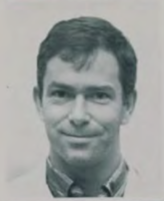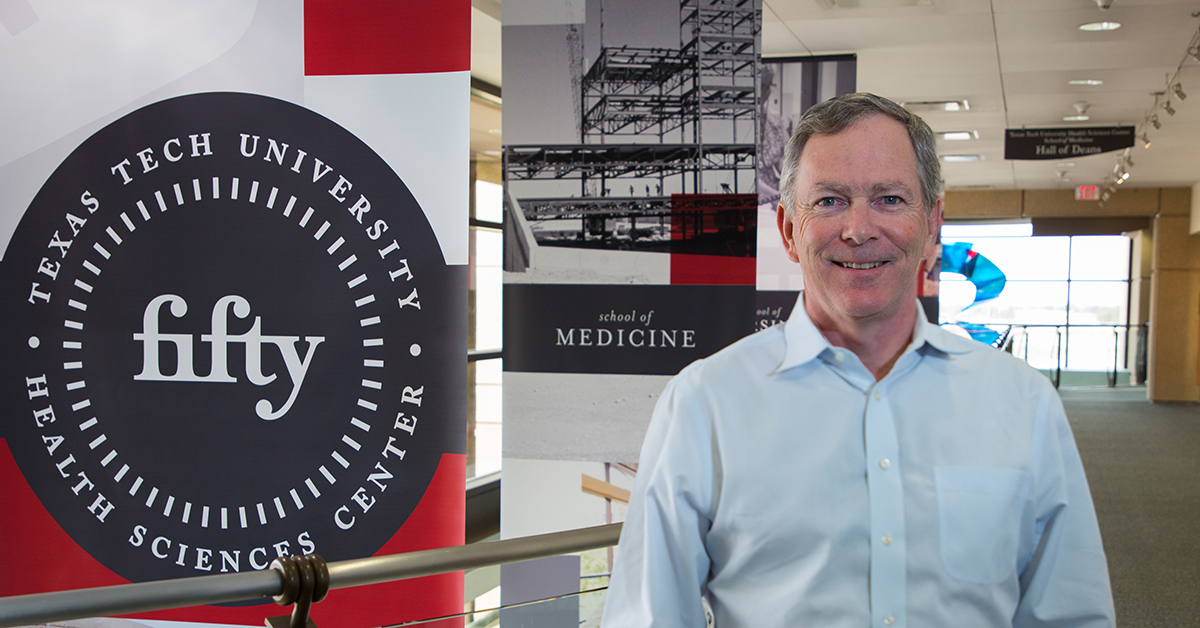Training physicians and having a positive impact on people is what motivates Simon
Williams, Ph.D., associate dean for Academic Affairs, at Texas Tech University Health
Sciences Center School of Medicine.
Williams, originally from Dublin, Ireland, moved to Lubbock, Texas, as an assistant
professor in 1995 after completing postdoctoral training in the area of gene regulation
and cancer at the National Cancer Institute in Frederick, Maryland. He was promoted
to associate professor in 2001 and served as Director of Research at the Southwest
Cancer Research and Treatment Center until 2005.

Dr. Williams as an associate professor of microbiology & immunology in 1996.
“I was in the Department of Biology and Biochemistry for 12 or 13 year and was pretty
successful—got research grants,” said Williams. “In 2006 I started getting involved
in curricuar activities in the School of Medicine and served on committees. I realized
my research career had the potential to eventually have some significant impact, but
for the most part, was not going to change the world that week. What I began to realize
was the if we did a better job of training physicians that I could actually have a
positive impact on many, many more people.”
Williams was chair of the curriculum committee in charge of redesigning the School
of Medicine’s curriculum in 2002 when he was named associate dean for Academic Affairs.
“My career now, which is very different from what it was before, is how do we educate
future physicians and how do we ensure that we’re educating future physicians to work
with other health professionals? It’s fantastic that we have all the schools here
and that we can train them together. Also how do we ensure that we meet the mission
of this institution, which is to ensure that we’re providing excellent health care
to the people of West Texas?” Williams said.
Part of training physicians includes making sure students are prepared for their future
by reexamining traditional teaching methods.

Dr. Williams has worked at TTUHSC School of Medicine since 1995.
“I think the future of education is going to be very different from what it has been.
I have a lot of interest in technology, so I’ve been working with [School of Medicine
Dean] Dr. [Steven] Berk as part of a team that have introduced lots of innovative
ways to educate by incorporating external resources into our curriculum. Also, the
idea that we can train our physicians quicker and just as well is an important innovation
that we’ve been trying. I’ve also been involved in our sex and gender curriculum to
make sure that our students are aware that women are different and we need to think
about them differently when we’re considering their health,” Williams said.
Williams acknowledges that the School of Medicine is a very “tough program” and that
students are under even more pressure than they were before.
“We attract brilliant, young people,” he said. “I think we have absolutely phenomenal
students who come to medical school and I think that we and the students need to work
together to make sure that we all achieve the goals that we’ve set for ourselves—training
them to be able to look after the people of West Texas, Texas and beyond.”
His commitment to helping educate physicians comes not only from his role at TTUHSC.
He is a member of the Lubbock, Texas, community.
“I’ve loved living here for the past 24 years. I met my wife [Kendra Rumbaugh, Ph.D.,
professor, Department of Surgery] here and we had our kids here. This institution
is an amazing place to work. It’s a much more amazing place now than it was when I
got here, and that’s partly because of the leadership we have. What I think is so
exciting about being here at this time is that we’re finally getting to the stage
where it doesn’t matter whether you’re in medicine, nursing, pharmacy or graduate
school, we’re all talking to each other about how we’re going to make sure that this
institution is a flagship pioneer institution for education in the future. We’re training
the best health professionals for our people around here and ourselves.
“It’s still the best place to work in that I’ve ever been and I’m delighted to still
be here.”
